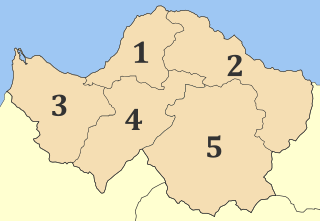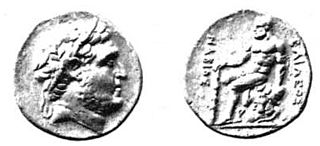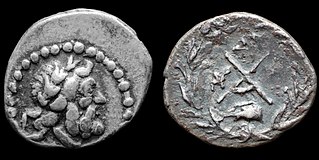
The Achaeans constitute one of the collective names for the Greeks in Homer's Iliad and Odyssey. The other common names are Danaans and Argives while Panhellenes and Hellenes both appear only once; all of the aforementioned terms were used synonymously to denote a common Greek civilizational identity. In the historical period, the Achaeans were the inhabitants of the region of Achaea, a region in the north-central part of the Peloponnese. The city-states of this region later formed a confederation known as the Achaean League, which was influential during the 3rd and 2nd centuries BC.

Achaea or Achaia, sometimes transliterated from Greek as Akhaia, is one of the regional units of Greece. It is part of the region of West Greece and is situated in the northwestern part of the Peloponnese peninsula. The capital is Patras. Its population surpassed 300,000 for the first time in 2001.

Aetolia is a mountainous region of Greece on the north coast of the Gulf of Corinth, forming the eastern part of the modern regional unit of Aetolia-Acarnania.

The Achaean League was a Hellenistic-era confederation of Greek city states on the northern and central Peloponnese. The league was named after the region of Achaea in the northwestern Peloponnese, which formed its original core. The first league was formed in the fifth century BC. The second Achaean League was established in 280 BC. As a rival of Antigonid Macedon and an ally of Rome, the league played a major role in the expansion of the Roman Republic into Greece. This process eventually led to the League's conquest and dissolution by the Romans in 146 BC.

Nabis was ruler of Sparta from 207 BC to 192 BC, during the years of the First and Second Macedonian Wars and the eponymous "War against Nabis", i.e. against him. After taking the throne by executing two claimants, he began rebuilding Sparta's power. During the Second Macedonian War, he sided with King Philip V of Macedon and in return he received the city of Argos. However, when the war began to turn against the Macedonians, he defected to Rome. After the war, the Romans, urged by the Achaean League, attacked Nabis and defeated him. He then was assassinated in 192 BC by the Aetolian League and was Sparta's last independent ruler. He represented the last phase of Sparta's reformist period.

Nestor of Gerenia was the wise King of Pylos described in Homer's Odyssey.

Calydon or Kalydon was a Greek city in ancient Aetolia, situated on the west bank of the river Evenus, 7.5 Roman miles from the sea. Its name is most famous today for the Calydonian Boar that had to be overcome by heroes of the Olympian age.
Sostratus of Cnidus, was a Greek architect and engineer. He is said to have designed the lighthouse of Alexandria, one of the Seven Wonders of the Ancient World, on the island of Pharos off Alexandria, Egypt. This claim is disputed.
Aegium or Aigion, or Aegeium or Aigeion (Αἴγειον), was a town and polis (city-state) of ancient Achaea, and one of the 12 Achaean cities. It was situated upon the coast west of the river Selinus, 30 stadia from Rhypae, and 40 stadia from Helice.

Dyme, or Dymae, was a town and polis (city-state) of ancient Achaea, and the most westerly of the 12 Achaean cities, from which circumstance it is said to have derived its name. It was situated near the coast, according to Strabo 60 stadia from the promontory Araxus, and according to Pausanias 30 stadia from the river Larisus, which separated its territory from Elis. It is further said by Strabo to have been formed out of an union of 8 villages, one of which was called Teuthea (Τευθέα); and it is probable, that some of the different names, by which the city is said to have been called, were originally the names of the separate villages. Thus, its more ancient name is stated by Pausanias to have been Paleia (Πάλεια), and by Strabo to have been Stratus or Stratos (Στρατός). The poet Antimachus gave it the epithet Cauconis, which was derived by some from the iron Caucon in the neighbourhood, and by others from the Caucones, who were supposed to have originally inhabited this district.

Keryneia is a village and a community in the municipal unit of Diakopto, Achaea, Greece. The community consists of the villages Keryneia and Nea Keryneia. It is located 6 km southeast of Aigio and 7 km west of Diakopto. The Greek National Road 8A passes between Keryneia and Nea Keryneia. In 2011 Keryneia had a population of 35 for the village and 362 for the community. The town takes its name from the ancient town of Ceryneia

The Cleomenean War was fought by Sparta and its ally, Elis, against the Achaean League and Macedon. The war ended in a Macedonian and Achaean victory.
Oebotas of Dyme, the son of Oenias, was an ancient Greek athlete from Dyme who won the stadion race in the sixth Ancient Olympic Games in 756 BC. The stadion race was the only competition in the first 13 Olympiads.
Sostratus was a Greek mythological hero, and a beloved of Heracles.

The Achaean War was an uprising by the Greek Achaean League, an alliance of Achaean and other Peloponnesian states in ancient Greece, against the Roman Republic around 146 BC, just after the Fourth Macedonian War. Rome defeated the League swiftly, and as a lesson, they destroyed the ancient city of Corinth. The war ended with Greece's independence taken away, and Greece became the Roman provinces of Achaea and Epirus.
Sostratus of Sicyon was an Olympic athlete and pankratiast from Sicyon in Ancient Greece, known for his style of fighting, bending or breaking his opponents fingers. He won the pankration crown at three successive Olympiads in 364, 360 and 356 BC. Further, he won 12 such victories at the Isthmian and Nemean Games combined, and two more at the Pythian Games in Delphi. According to the extant records, his feat of three Olympic victories in the pankration was equaled by only three others and surpassed by no-one in the over 1000-year history of the ancient Olympic Games.
The Siege of Syracuse in 278 BC was the last attempt of Carthage to conquer the city of Syracuse. Syracuse was weakened by a civil war between Thoenon and Sostratus. The Carthaginians used this opportunity to attack and besiege Syracuse both by land and sea. Thoenon and Sostratus then appealed to king Pyrrhus of Epirus to come to the aid of Syracuse. When Pyrrhus arrived, the Carthaginian army and navy retreated without a fight.













